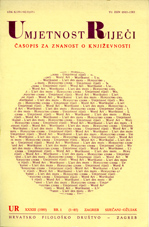O modusima književnosti (kroz pokušaje definiranja i bježnu recepciju)
On the Modes of Literature (through Attempts of Definition and Fugitive Reception)
Author(s): Mladen MachiedoSubject(s): Literary Texts
Published by: Hrvatsko filološko društvo
Summary/Abstract: The complex relationship between hypotheses and the infinite number of possible well-argued antitheses characterizes the efforts towards »educational« definitions of literature in cognitive terms (Wellek-Warren, Škreb, Girardi). In this sphere oral, documentary and trivial literature deserve special attention. But the tone of modern creative literature is determined by the avant-garde, highlighting their working programme by means of radical pragmatism (Lucini, Sanguineti), or in an utopian way, indudingcognition (Gramsci, Savinio), today even in scholarly circles (Segre). Typological co-existence, i. e. chronological alternation (or »tension«) between the two tendencies - cognitive and dynamic - are taken into consideration only by few global syntheses (Vittorini and, as his critic, Calvino). Unlike ancient and medieval authorities (e. g. Dante's threats to the unprepared reader), the awareness of reception has been shaping ever since Romanticism (e. g. between Leopardi and Jauss). The surprising wealth of negative impacts of literature (Dante's Francesca, Don Quixote, Madame Bovary, Calvino's Adventure of a Reader) is successfully resisted by the etymologies of all encompassing titles (ever since the Bible), as well as by the cosmic-anthropological apology of the book (again Dante, Galilei, Casanova, Mallarmé). The additional experiment of the novel, or of the anti-novel, about reading, does not belong exclusively to contemporary literature (e. g. in his If Some Traveller on a Winter Night Calvino actually repeats Bontempelli's Intensive Life). The what is complemented by how to read (by means of appropriate examples from Vico, Pirandello, and others, to the claims by A. B. Šimić, Barthes, and Todorov), and - in conclusion - (in an imaginary dialogue with Eco, Bigongiari and Block de Behar) the two-way communication between activating the »Loneliness« of the text and its »ghostly« reception, dramatized by the dilemma of either writing or reading, where the critic as an occasional reader sets in motion (even if within literature) the methodology of the proposed problems: by means of recovered unpredictable historicity.
Journal: Umjetnost riječi
- Issue Year: 1989
- Issue No: 1
- Page Range: 7-31
- Page Count: 25
- Language: Croatian
- Content File-PDF

